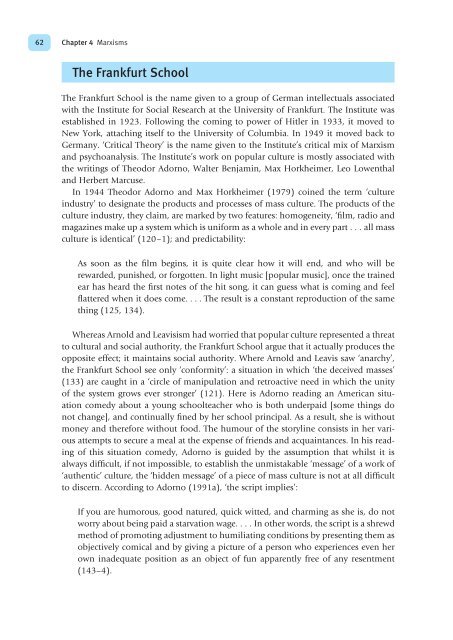Cultural Theory and Popular Culture
Cultural Theory and Popular Culture
Cultural Theory and Popular Culture
Create successful ePaper yourself
Turn your PDF publications into a flip-book with our unique Google optimized e-Paper software.
62<br />
Chapter 4 Marxisms<br />
The Frankfurt School<br />
The Frankfurt School is the name given to a group of German intellectuals associated<br />
with the Institute for Social Research at the University of Frankfurt. The Institute was<br />
established in 1923. Following the coming to power of Hitler in 1933, it moved to<br />
New York, attaching itself to the University of Columbia. In 1949 it moved back to<br />
Germany. ‘Critical <strong>Theory</strong>’ is the name given to the Institute’s critical mix of Marxism<br />
<strong>and</strong> psychoanalysis. The Institute’s work on popular culture is mostly associated with<br />
the writings of Theodor Adorno, Walter Benjamin, Max Horkheimer, Leo Lowenthal<br />
<strong>and</strong> Herbert Marcuse.<br />
In 1944 Theodor Adorno <strong>and</strong> Max Horkheimer (1979) coined the term ‘culture<br />
industry’ to designate the products <strong>and</strong> processes of mass culture. The products of the<br />
culture industry, they claim, are marked by two features: homogeneity, ‘film, radio <strong>and</strong><br />
magazines make up a system which is uniform as a whole <strong>and</strong> in every part . . . all mass<br />
culture is identical’ (120–1); <strong>and</strong> predictability:<br />
As soon as the film begins, it is quite clear how it will end, <strong>and</strong> who will be<br />
rewarded, punished, or forgotten. In light music [popular music], once the trained<br />
ear has heard the first notes of the hit song, it can guess what is coming <strong>and</strong> feel<br />
flattered when it does come. . . . The result is a constant reproduction of the same<br />
thing (125, 134).<br />
Whereas Arnold <strong>and</strong> Leavisism had worried that popular culture represented a threat<br />
to cultural <strong>and</strong> social authority, the Frankfurt School argue that it actually produces the<br />
opposite effect; it maintains social authority. Where Arnold <strong>and</strong> Leavis saw ‘anarchy’,<br />
the Frankfurt School see only ‘conformity’: a situation in which ‘the deceived masses’<br />
(133) are caught in a ‘circle of manipulation <strong>and</strong> retroactive need in which the unity<br />
of the system grows ever stronger’ (121). Here is Adorno reading an American situation<br />
comedy about a young schoolteacher who is both underpaid [some things do<br />
not change], <strong>and</strong> continually fined by her school principal. As a result, she is without<br />
money <strong>and</strong> therefore without food. The humour of the storyline consists in her various<br />
attempts to secure a meal at the expense of friends <strong>and</strong> acquaintances. In his reading<br />
of this situation comedy, Adorno is guided by the assumption that whilst it is<br />
always difficult, if not impossible, to establish the unmistakable ‘message’ of a work of<br />
‘authentic’ culture, the ‘hidden message’ of a piece of mass culture is not at all difficult<br />
to discern. According to Adorno (1991a), ‘the script implies’:<br />
If you are humorous, good natured, quick witted, <strong>and</strong> charming as she is, do not<br />
worry about being paid a starvation wage. . . . In other words, the script is a shrewd<br />
method of promoting adjustment to humiliating conditions by presenting them as<br />
objectively comical <strong>and</strong> by giving a picture of a person who experiences even her<br />
own inadequate position as an object of fun apparently free of any resentment<br />
(143–4).
















